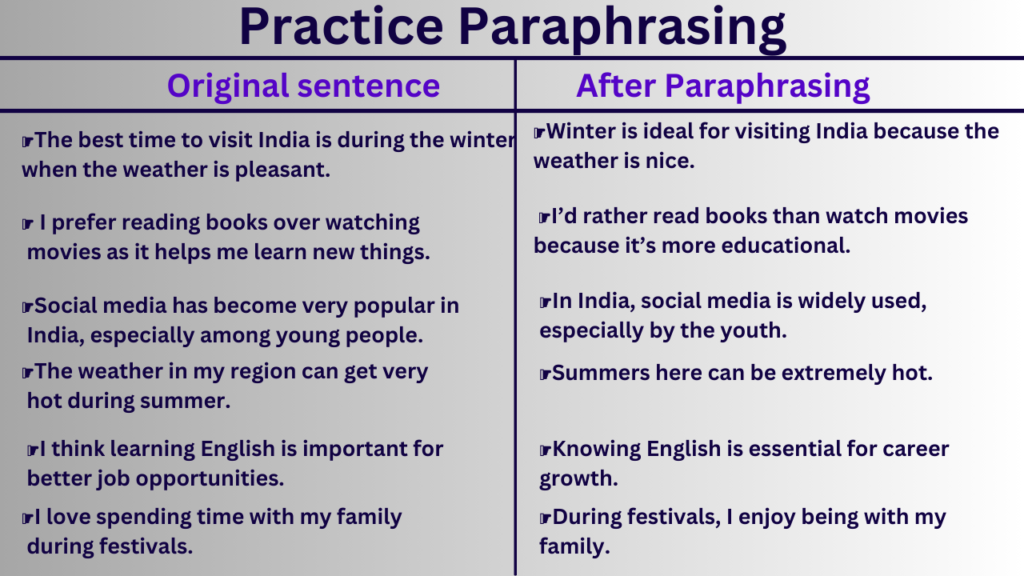Get a Higher IELTS Speaking Band Score with This Easy Step-by-Step Guide

Introduction to IELTS Speaking:
The IELTS (International English Language Testing System) speaking test is a crucial test one needs to take if one is aspiring to study abroad, immigrate or achieve fluency in English. The IELTS Speaking test is designed to gauge the ability of candidates to communicate clearly and effectively in English. In this blog post, we’ll explore strategies, tips and examples to help you ace the IELTS speaking test. By the end of this post, you’ll be equipped with the tools to achieve your desired score, with ease.
The IELTS Speaking Test
Before discussing the specific strategies to deliver your best performance, it is crucial to know the format of the IELTS speaking test. Understanding the nature and structure of the IELTS Speaking test is crucial for effective preparation and optimal performance. This test is designed to assess the ability to communicate in English naturally and effortlessly. The test lasts between 11-14 minutes and has three parts:
Part 1: Introduction and General Questions (4-5 minutes)
The examiner introduces himself and asks for your introduction. Also, you will be asked some general questions about your hobbies, education, family, job etc. This part sets a conversational tone for the test. You are expected to answer these questions in two or three sentences. Practice answering common questions with full sentences, ensuring your responses are fluent and natural. For instance, if asked, “What do you enjoy doing in your free time?” you could answer:
“In my free time, I enjoy reading novels, especially mystery and thriller genres. It helps me relax and also sharpens my mind.”
Practice these kinds of questions regularly to gain confidence and spontaneity in your responses.
Part 2: Long Answer (3-4 minutes)
The examiner provides a cue card with a topic on it. Also, he provides a paper for writing notes during the preparation time. You get one minute to prepare for the topic and answer between 1-2 minutes. This part assesses the candidate’s ability to organize thoughts, present ideas coherently, and demonstrate fluency without interruptions. To organize your thoughts, structure your speech with an introduction, main points, and a conclusion. For example:
“One of the most memorable trips I have taken was to Japan. During this trip, I visited several historic temples and explored the bustling streets of Tokyo. The experience enriched my understanding of Japanese culture and left me with unforgettable memories.”
Part 3: Discussion (4-5 minutes)
The examiner asks more questions related to the topic from Part 2. This part tests your ability to express opinions, analyze, and discuss ideas in-depth. Practice discussing various topics in depth, focusing on providing reasons and examples to support your views. For example, if asked, “Do you think travel is necessary for cultural understanding?” you might respond:
“Yes, I believe travel is essential for cultural understanding. When you travel, you immerse yourself in different cultures, meet new people, and observe their customs. This experience fosters a deeper appreciation and respect for different ways of living.”
Understanding the Evaluation Criteria
In the IELTS Speaking test, examiners assess candidates using four key criteria: Fluency and Coherence, Lexical Resource, Grammatical Range and Accuracy, and Pronunciation. Understanding these criteria is crucial for candidates aiming to achieve higher scores.
Fluency and Coherence
Fluency and Coherence examine let your ideas flow in a logical and smooth way. Fluency refers to the ability to speak smoothly without pausing for a long time. Coherence involves organizing your speech so that it is logical and easy to follow. For example, using linking words like “however,” “because,” and “therefore” helps create connections among your ideas, improving coherence.
Lexical Resource
Lexical Resource relates to the range of vocabulary you use and how accurately you can use it. This criterion evaluates your ability to use various words effectively and appropriately in context. Demonstrating a wide range of words, idiomatic expressions, and phrases can significantly boost your score. For instance, discussing a topic about technology, you might use terms like “cutting-edge,” “innovation,” and “digital revolution” to showcase your Lexical Resource.
Grammatical Range and Accuracy
Grammatical Range and Accuracy focus on how well you can use different grammatical structures. Grammatical accuracy refers to the correct usage of grammar concepts. For example, describing past events accurately using past tense verbs, or hypothetical sentences with “would” or “could,” can demonstrate a wide grammar range.
Pronunciation
Pronunciation assesses the clarity and the ability to use English effortlessly. This involves the correct articulation of words, appropriate intonation, and stress patterns. Mispronunciations can lead to misunderstandings, thereby affecting your score negatively. It’s essential to make sure your speech is clear and can be easily understood by the listener. Practicing with native speakers or using phonetic exercises can help improve this area.
Understanding the evaluation criteria of the IELTS speaking test allows candidates to practice more effectively. Focusing on these areas not only helps improve their performance but also ensures that their efforts are directed towards the specific skills that are evaluated. By systematically working on each criterion, candidates can achieve their target score in IELTS Speaking.
Improving Your IELTS Speaking
1. Familiarize Yourself with the Test Format
Getting familiar with the test format ensures that you are on the track. Also, it helps in managing time effectively and reduces stress.
Practical Tips:
- Review Sample Questions: Find questions which have already been asked in the previous IELTS exam. They can be found easily on the official IELTS website or on other online sources or books.
- Watch Test Videos: Watching videos of real IELTS speaking tests can help you a lot in knowing where you stand now and how much improvement is required to meet your goal.
- Practice with a Timer: Simulate test conditions by practicing with a timer. This will help you manage your time during the actual test.
Example:
If you’re practicing for Part 1, you might prepare answers for common questions like:
- “Can you tell me about your hometown?”
- “What do you enjoy doing in your free time?”
- “Are you a student or do you work?”
- “How many members are there in your family?”
2. Improve Your Vocabulary and Grammar
Having a wide range of vocabulary is essential for scoring well in the IELTS speaking test. You must know how to use words in the right context. Also, having knowledge of grammatical structures helps getting the desired score. Examiners look for the appropriate use of various grammatical structures, including complex sentences, to assess your spoken English skills.
Practical Tips:
- Learn Synonyms: Paraphrasing is an important skill required for good scores in the test. This can be done easily by learning synonyms of common words. This way you can avoid repetition and make a variety of sentences, even if, you have limited idea.
- Practice Using Idioms: Usage of idioms elevates the level of your writing, provided, you know how to use them correctly, in the right context.
- Review Grammar Rules: Try learning different grammatical structures and use them, in your sentences. Also, avoid making common grammatical mistakes by reviewing grammar rules, whenever needed. One effective way to enhance your grammatical accuracy is to practice using different grammatical structures, particularly those that require more advanced usage. This involves transforming simple sentences into complex ones, incorporating dependent clauses, and experimenting with various sentence structures.
Example:
Instead of saying, “I like to travel because it’s fun,” you could say, “I enjoy traveling because it allows me to explore new cultures and broaden my horizons.”
Want to learn new English words faster?
Grab my ebook : Talk Like A Pro : English Words for Real-Life Situations – having meaning of every word put into specific categories, along with relevant examples.
3. Develop Fluency and Coherence
Fluency refers to the ability to speak spontaneously without taking long pauses while coherence refers to the connectivity among ideas. There should be a logical flow of ideas, in your speaking. In order to increase coherence use more and more connectors like however, additionally, in fact etc. Both are crucial for a high score. Developing fluency and coherence is a gradual process requiring persistence
Practical Tips:
- Practice Speaking Daily: Fluency can be increase easily, by regular practice. Keep aside some time every day for practicing speaking in English. If it is difficult to find a speaking partner, one should practice by oneself. This might feel awkward initially, but it can significantly boost your confidence and speaking rhythm. Try expressing your daily activities out loud or discussing different topics you are interested in.
- Use Linking Words: Words like “to begin with,” “consequently,” and “in addition” can help you connect your ideas and speak in a coherent way. They guide the listener through your discourse and explain connections between ideas clearly.
- Avoid Overthinking: Initially, don’t think too much about perfection in grammar. Instead, focus on expressing your ideas clearly and naturally.
Example:
When discussing a topic, structure your response like this:
- “Firstly, I believe that…”
- “Secondly, it’s important to consider that…”
- “In conclusion, I would say that…”
4. Enhance Pronunciation and Intonation
Pronunciation plays a major role in getting your ideas across well. Also, intonation can enhance your speaking abilities. Pronunciation influences the clarity and comprehension of your speech, which significantly affects your speaking score.
Practical Tips:
- Listen to Native Speakers: Observing how native speakers speak, can go a long way in improving your pronunciation. Consistent listening practice helps you identify the natural patterns of speech, allowing you to grasp the intonation and rhythm of the language For this purpose, watch English movies, listen to English podcasts or follow relevant YouTube channels.
- Record Yourself: Recording yourself while speaking can help you understand your weak areas. Also, you can track your progress by comparing your recent videos with the old ones.
- Practice with Tongue Twisters: Tongue twisters are a fun way to improve your pronunciation and fluency. They challenge your ability to articulate words clearly.
- Practice challenging sounds and words daily: Individual sounds and words that you find challenging should be practiced regularly. Record yourself pronouncing these words. Focus on difficult sounds, such as the ‘th’ in “thought” or the ‘r’ in “river,” and practice them in different word contexts. Repetition and focused practice will help you achieve more precise articulation over time.
Example:
A common tongue twister to practice pronunciation is:
“She sells seashells by the seashore.”
5. Master the Art of Paraphrasing
Paraphrasing is a powerful tool to get your target scores easily. With paraphrasing, you learn to express ideas in different ways. Learning paraphrasing takes time and you need to have patience and put in efforts, on a daily basis.

Practical Tips:
- Practice Rephrasing Sentences: Try paraphrasing individual sentences whenever you have time. This is a fun activity and it helps you use your current vocabulary in different contexts. For example, instead of saying, “I like to read books,” you could say, “Reading is one of my favorite hobbies.”
- Use Synonyms and Different Structures: Experiment with using synonyms and varying sentence structures to paraphrase effectively.
- Answer Indirectly: Whenever you have a doubt about the accuracy of any sentence you made, try rephrasing it. This gives you more time to think and shows your ability to handle unexpected questions.
Example:
If asked, “Do you think technology has improved our lives?” you might respond:
“In my opinion, technology has certainly made our lives more convenient, particularly in terms of communication and access to information.”
6. Expand Your Ideas with Examples
Providing examples validates your ideas and helps examiner understand the main idea well. It also makes your speech more interesting and relatable.
Practical Tips:
- Use Personal Experiences: Whenever required, share your personal experiences as examples. This makes your responses more authentic.
- Think of General Examples: It is not possible always to come up with personal examples for every topic. In such vases, one should use general examples.
- Practice Elaborating: Take a simple statement and practice expanding it with details and examples. This will help you give more comprehensive answers.
Example:
If asked about your favorite holiday, you could say:
“I love visiting the mountains because the fresh air and scenic views are so refreshing. For example, last year, I went hiking in the Mount Fuji, and the view from the peak was absolutely breath taking.”
7. Practice Mock Tests
Attempting mock tests is one of the best ways to prepare for the IELTS speaking test. It helps you manage your time, reduce anxiety, and get comfortable with the test format.
Practical Tips:
- Take Mock Tests: Practice with mock tests that mimic the actual IELTS speaking test. Check if you can answer well in the stipulated time.
- Get Feedback: If possible, someone act as the examiner. They can provide valuable feedback on your performance and areas for improvement.
- Focus on staying calm: Practice staying calm when you feel stress. Deep breathing exercises before speaking can help reduce anxiety.
Example:
Set up a mock test by selecting a few sample questions for each part of the IELTS speaking test. Answer them while recording yourself, and then review your performance to identify areas where you need improvement.
8. Work on Your Confidence

Confidence can significantly impact your score in the IELTS speaking test. The more confident you are, the better you will be able to express your ideas. Also, it helps you in reducing mistakes while speaking.
Practical Tips:
- Practice Public Speaking: Either you practice in front of a mirror or try speaking in public. By using these ways, you can increase your confidence level faster.
- Visualize Success: Visualize yourself performing well in the test. Positive visualization can boost your confidence and reduce anxiety.
- Prepare for Common Topics: Familiarize yourself with common IELTS speaking topics such as education, work, hobbies, and the environment. These topics don’t require much preparation but give you enough confidence for speaking on any given topic.
Example:
If you’re nervous about public speaking, start by practicing in front of a small group of friends or family. Gradually increase the size of your audience as your confidence grows.
9. Learn from Feedback
Receiving feedback from others is fruitful when you take them positively and work to improve your weak areas. It allows you to identify mistakes, refine your skills, and track your progress.
Practical Tips:
- Work with a Tutor: If possible, work with an IELTS tutor who can provide personalized feedback and guidance based on the evaluation criteria for the IELTS test.
- Join an IELTS Study Group: Joining an IELTS study group can offer help as it provides a supportive environment. Also, you can share views and methods to improve a specific area which you find challenging.
- Self-Assessment: After each practice session, review your performance. Identify areas where you did well and areas where you can improve.
Example:
If a tutor points out that you speak in a hurried manner, practice slowing down your speech. Focus on speaking each word clearly and taking brief pauses between sentences.
10. Stay Consistent and Persistent
Consistency helps you get results faster. Regular practice, combined with a positive attitude, will help you achieve your goals.
Practical Tips:
- Set a Study Schedule: Dedicate specific times each day to practice your speaking skills. Consistency is a key to improvement.
- Celebrate Small Wins: Recognize and celebrate your progress, no matter how small. This will keep you motivated and encouraged.
- Don’t Give Up: If you encounter challenges or setbacks, don’t get discouraged. Get help from friends or online resources and keep going.
Example:
Set a goal to practice speaking for 20 minutes every day. Track your progress in a journal and reward yourself whenever you see improvement in your speaking.
Frequently Asked Questions (FAQs)
1. What is the IELTS Speaking Test and why is it important?
The IELTS Speaking Test is a face-to-face interview with an examiner designed to assess your spoken English skills. It evaluates your fluency, pronunciation, vocabulary, and grammatical accuracy. Since it counts for 25% of your overall IELTS band score, strong speaking performance can make a major difference in your results.
2. What is the IELTS Speaking Test format?
The IELTS Speaking Test format has three parts:
- Part 1: General questions about yourself and familiar topics (4–5 minutes).
- Part 2: A cue card or long-turn task where you speak for 1–2 minutes on a given topic.
- Part 3: A two-way discussion with the examiner on more abstract ideas.
This structure helps assess both your conversational and analytical speaking ability.
3. How long is the IELTS Speaking Test?
If you’re wondering how long is the IELTS Speaking Test, it usually lasts 11 to 14 minutes. Even though it’s short, the examiner evaluates you across all criteria, so every minute counts.
4. What are the most common IELTS Speaking topics?
IELTS Speaking topics often include familiar themes like hobbies, hometown, travel, work, education, and social trends. Part 2 may focus on describing experiences or people, while Part 3 involves discussing broader issues like technology or culture.
5. How can I prepare effectively for the IELTS Speaking Test?
For IELTS Speaking Test practice, simulate real interviews. Record yourself answering questions, review your fluency and pronunciation, and practice with partners or tutors. You can also try IELTS Speaking mock tests online to get comfortable with timing and question patterns.
6. Where can I find IELTS Speaking Test sample questions and answers?
You can access IELTS Speaking questions and answers on official IELTS websites, study apps, and YouTube channels. Reviewing IELTS Speaking Test samples helps you understand how fluent candidates structure their responses and use linking words effectively.
7. What is evaluated during the IELTS Speaking Test?
The IELTS Speaking Test evaluation criteria include:
- Fluency and coherence – how naturally you speak
- Lexical resource – range of vocabulary used
- Grammatical range and accuracy – correctness and complexity
- Pronunciation – clarity and intonation
Understanding these criteria helps you focus your IELTS Speaking practice more effectively.
8. How is the speaking test score in IELTS calculated?
If you’re curious how is speaking test score in IELTS determined, each of the four criteria (fluency, vocabulary, grammar, pronunciation) is scored on a 0–9 scale. The average of these scores becomes your final IELTS Speaking Test band score. For instance, if you score 7 in three areas and 6 in one, your final band would be 6.5.
9. What are some tips to improve my IELTS Speaking band score?
- Don’t memorize answers; sound natural.
- Expand responses with examples and reasons.
- Focus on fluency before accuracy.
- Practice IELTS Speaking Test questions regularly with feedback.
- Review IELTS Speaking mock test recordings to identify mistakes and improve.
10. How can I overcome nervousness during the IELTS Speaking Test?
Feeling anxious is normal. To stay calm, get familiar with the IELTS Speaking Test format through frequent IELTS Speaking Test practice. Focus on having a conversation rather than a test. Smile, breathe deeply, and remember—you’re being evaluated on communication, not perfection.
Conclusion:
Improving your IELTS speaking skills is achievable with the right strategies and consistent practice. By following the tips outlined in this guide, you’ll be able to achieve your target score quite soon. Remember, the key is to stay positive, practice regularly, and seek feedback to refine your skills.
With dedication and the right approach, you can achieve your desired score in the IELTS speaking test. Start practicing today and you’ll be speaking confidently in no time!
Share your thoughts:
I invite you to share your experiences, questions, or tips in the comments section below. Your insights can greatly benefit fellow aspirants preparing for IELTS. I continually strive to provide valuable content to our readers, and your feedback is instrumental in that pursuit.
Don’t forget to subscribe to our blog for more tips, resources, and updates on mastering the IELTS test. Also, let me know if you have any concern or query. I’m here to support you on your journey to success!
I create content to make English learning simple and practical. If you find it helpful, consider supporting me Your contribution helps me improve my skills and bring better content for you.




Unquestionably believe that which you stated. Your favorite justification seemed to be at the net the simplest factor to take into account of. I say to you, I definitely get irked whilst other folks consider concerns that they just do not recognise about. You controlled to hit the nail upon the top and also defined out the whole thing without having side-effects , people can take a signal. Will likely be again to get more. Thanks
Awsome article and right to the point. I don’t know if this is in fact the best place to ask but do you people have any ideea where to hire some professional writers? Thx 🙂
As a Newbie, I am constantly browsing online for articles that can benefit me. Thank you
You’re welcome! I’m happy to know that you found it useful.
Very interesting topic, appreciate it for putting up. “Challenge is a dragon with a gift in its mouthTame the dragon and the gift is yours.” by Noela Evans.
Thank you for appreciating my article!:)
I went over this website and I conceive you have a lot of wonderful information, bookmarked (:.
Thank you! will bring more interesting stuff soon.
Your house is valueble for me. Thanks!…
That’s so sweet of you! Thanks a ton.
So sweet of you! Thank you so much.
Does your site have a contact page? I’m having problems locating it but, I’d like to send you an e-mail. I’ve got some suggestions for your blog you might be interested in hearing. Either way, great site and I look forward to seeing it expand over time.
Of course! You can reach out to info@sonikabahadur.com. I would love to read your suggestions. Thank you.
I’m still learning from you, while I’m trying to reach my goals. I absolutely liked reading all that is written on your blog.Keep the stories coming. I loved it!
Thank you for your constructive feedback! Keep reading.
There is noticeably a bundle to find out about this. I assume you made certain good factors in options also.
Thank you!
This is very interesting, You’re a very skilled blogger. I have joined your rss feed and look forward to seeking more of your fantastic post. Also, I have shared your website in my social networks!
Will keep posting useful articles on my site. Thank you for everything!
This web site is my inhalation, really fantastic pattern and perfect content.
Thank you! Glad that you found value in my content.
You should participate in a contest for the most effective blogs on the web. I will suggest this website!
Thank you for your support! Will do that, for sure.:)
You have remarked very interesting points! ps nice web site.
Thank you for your feedback!
I love it when people come together and share opinions, great blog, keep it up.
Thank you for your feedback!
Write more, thats all I have to say. Literally, it seems as though you relied on the video to make your point. You clearly know what youre talking about, why throw away your intelligence on just posting videos to your site when you could be giving us something informative to read?
Videos are there to aid learning. I’ll surely keep your suggestions in mind. Thank you!
I do agree with all of the ideas you’ve presented in your post. They’re very convincing and will definitely work. Still, the posts are very short for starters. Could you please extend them a little from next time? Thanks for the post.
Thanks for your suggestion! Will keep that in mind.
Someone necessarily lend a hand to make critically articles I would state. That is the very first time I frequented your web page and to this point? I amazed with the analysis you made to make this particular post incredible. Wonderful process!
Thank you for your feedback! Will try my best to bring even more useful content.
Pretty part of content. I just stumbled upon your website and in accession capital to claim that I acquire actually loved account your blog posts. Anyway I’ll be subscribing in your feeds or even I achievement you access consistently fast.
Thank you for the lovely feedback!
You are my inhalation, I have few blogs and occasionally run out from post :). “Analyzing humor is like dissecting a frog. Few people are interested and the frog dies of it.” by E. B. White.
Thank you! Keep coming back for more.
Pretty section of content. I just stumbled upon your site and in accession capital to assert that I get actually enjoyed account your blog posts. Any way I will be subscribing to your feeds and even I achievement you access consistently fast.
Thank you for liking my content!
Very interesting points you have mentioned, regards for putting up.
Thanks for your feedback!
Thanks for every other fantastic article. Where else could anyone get that kind of info in such an ideal method of writing? I’ve a presentation subsequent week, and I am at the search for such information.
Excellent goods from you, man. I’ve keep in mind your stuff prior to and you are just extremely great. I really like what you have bought right here, really like what you are stating and the way in which you say it. You are making it enjoyable and you continue to care for to keep it sensible. I can not wait to learn much more from you. That is actually a terrific website.
Somebody essentially help to make seriously posts I would state. This is the first time I frequented your web page and thus far? I surprised with the research you made to create this particular publish extraordinary. Great job!
Thank you for another informative blog. The place else could I get that type of information written in such an ideal approach? I’ve a project that I am simply now running on, and I have been on the glance out for such information.